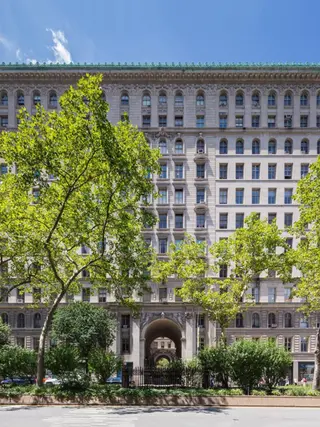 Carter Horsley
Carter HorsleyDec 23, 2011
Carter's Review
One of the city's grandest apartment buildings and one of the few major courtyard buildings, the Apthorp is one of the most important landmarks on the Upper West Side.
This is the handsomest, full-block courtyard building on the Upper West Side, considerably more elegant than the Belnord, which is on Broadway at 86th Street.
It was designed in 1908 by Clinton & Russell, who were the architects also of the Astor and Graham Court apartment buildings and the Cities Service skyscraper at 70 Pine Street.
The free-standing, 12-story building has 163 apartments, no balconies, a rusticated limestone base, protruding air-conditioners and no health club.
Bottom Line
The only major, full-block apartment building that is truly palatial in scale and style with a magnificent entry, an excellent courtyard and proximity to Zabar’s and the subway.
Description
In their excellent book, "The A.I.A. Guide to New York City, Fourth Edition," (Three Rivers Press, 2000), Norval White and Elliot Willensky wrote that "monumental and magnificent, this richly ornamented limestone Renaissance Revival building occupies an entire block," adding that "the individual entrances are reached through high vaulted tunnels and a large interior court in its center."
The double-height-entrance vaults have very handsome cast-iron gates with sculpted gazelle heads facing the courtyard and the façade is richly decorated with putti beneath the cornice.
It is across 79th Street from the First Baptist Church that was designed by George Keister in 1894 in an eclectic style described by White and Willensky as "overexuberant Italian Romanesque (Broadway division)." The interior portion of the entrance gates facing Broadway features large heads of antelopes.
Amenities
Mail is delivered by hand to the apartments, many of which have fireplaces.
The building has a doorman, a spa and fitness center, a children’s playroom and craft center, storage rooms, an entertainment suite with a catering kitchen and media facilities, a resident manager and a garage.
Apartments
In his book, "New York's Fabulous Luxury Apartments with Original Floor Plans from the Dakota, River House, Olympic Tower and Other Great Buildings" (Dover Publications, Inc., 1975), Andrew Alpern noted that the Apthorp "originally contained ten apartments per floor," adding that "during the thirties and forties many of these were cut into smaller units to accommodate changing patterns of urban living."
"The apartments are particularly well detailed, with each of the original suites containing a room-sized foyer with a mosaic tile floor. There are glass-paneled French doors throughout, and many of the rooms are ringed with Wedgwood-esque [sic] friezes."
Penthouse Q is a one-bedroom unit facing the courtyard with a 6-foot-long entry foyer opening into a 15-foot-long living room next to a pass-through kitchen.
Apartment 10G is a two-bedroom unit with a 20-foot-long entry foyer that leads to a 26-foot-long living room with a fireplace across from a 15-foot-square dining room next to a 24-foot-long kitchen.
Apartment 11C is a four-bedroom unit with a 28-foot-long entrance gallery that leads to a 23-foot living room with a fireplace on one side and the 18-foot-long dining room with fireplace on the other side next to the enclosed 13-foot-long kitchen.
Apartment 11F is a one-bedroom unit with a 15-foot-long foyer and a long gallery with a 23-foot-long living room with a fireplace and a 23-foot-long bedroom with a fireplace on one side and a 22-foot-long dining room next to an enclosed 15-foot-long eat-in kitchen.
Apartment 11K is a four-bedroom unit with a 21-foot-long entrance room leading to a 21-foot-long living room with a fireplace and a 21-foot-long dining room with a fireplace next to a 15-foot-long enclosed kitchen.
Apartment 11J has a 23-foot-long entrance foyer that leads to a 15-foot-long library with a fireplace, a 21-foot-long living room with a fireplace, and a 21-foot-long dining room with a fireplace next to a 21-foot-long enclosed kitchen.
Apartment 2C is a six-bedroom unit with a 29-foot-long entry foyer that leads to a 24-foot-long living room with a fireplace across from an 18-foot-long dining room with a fireplace. The apartment has a 21-foot-long kitchen.
Apartment 5E is a three-bedroom unit at the building’s southwest corner. It has three bedrooms and a 14-foot-square entrance foyer that leads to a 19-foot-long living room and a 19-foot-long kitchen next to a 15-foot-long kitchen.
Apartment 6G is a two-bedroom apartment with a 14-foot-long entrance foyer that leads to a 26-foot-long living room that opens onto a 15-foot-long dining room next to a 17-foot-long kitchen.
History
In her excellent book, "New York, New York, How the Apartment House Transformed the Life of the City 1869-1930," (An Owl Book, Henry Holt and Company, New York, 1993), Elizabeth Hawes provides the following commentary about the Apthorp:
"William Waldorf Astor, who was called the landlord of New York despite the fact that he had lived in England since the 1890s, had been sitting on his properties for almost a generation, and his decision to build apartment houses on them now served to signal the world that the movement for development was nigh....Where a pretty two-story stone-and-frame house had stood for a century and a half, the Apthorp Apartments rose now. Until conversion to a roadhouse and hotel in the late 1850s, the house had been the country seat of Baron John Cornelius Van Den Heuvel, the son-in-law of the prominent lawyer Charles Ward Apthrope, and sat at the southern end of Apthorpe's rolling two-hundred-acre estate....Astor's endorsement of the Beaux-Arts courtyard building was early and expansive....The Graham was grand; the Apthorp was triumphant....Inside and out, the Apthorp was an exceptional building, and it showed off the new aesthetics to advantage....One hundred and four families lived in the Apthorp, which made it a vast holding, the largest of its kind in the world to date....There were hundreds of house phones or ash bins or mail chutes in the building, for example. On the top floor, there were 150 porcelain tubs, 20 boiling tubs, and 20 steam dryers in the laundry rooms - and as many irons in the ironing room...."
The Apthorp was built by the Astor family who also erected Astor Court at 205 West 89th Street, ten blocks to the north, which also has a large garden courtyard, but is not a full block building.
There is a subway station at Broadway and 79th Street. Riverside Drive is nearby as is Zabar's. There is excellent local shopping.
In March, 2007, Africa-Israel USA, which is headed by Les Leviev, became a 50-50 partner with Mann Realty Services, which is headed by Maurice Mann, in the ownership of the Apthorp apartment building.
Mann Realty Services acquired the landmark building in 2006 for $426 million.
John Herbitter of Mann Realty Services told CityRealty.com in an interview on March 8, 2007, that an application to the Landmarks Preservation Commission about the unused air rights "is in planning."

- Condo built in 1908
- Converted in 2008
- 5 apartments currently for sale ($3.325M to $9.567M)
- 1 apartment currently for rent ($25K)
- Located in Riverside Dr./West End Ave.
- 163 total apartments 163 total apartments
- 10 recent sales ($901.2K to $7M)
- Doorman
- Pets Allowed
 6sqft delivers the latest on real estate, architecture, and design, straight from New York City.
6sqft delivers the latest on real estate, architecture, and design, straight from New York City.
